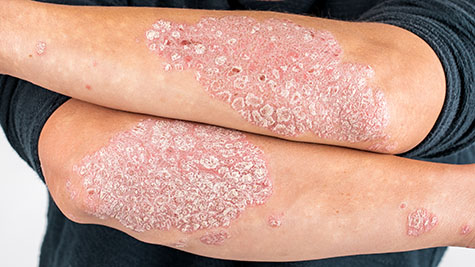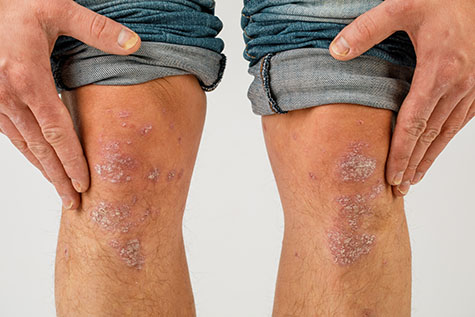What Causes Psoriasis?

Psoriasis is not contagious and is not an infection. The cause of psoriasis is still not completely understood, but our current understanding suggests that certain immune cells are overactive in the skin resulting in itchy, scaly, pink patches over certain areas of the body. Every day we are developing a better understanding of the various immune cells that cause psoriasis which helps guide our future treatment options.
We also know that this condition is genetic and tends to run in certain families more than others. Psoriasis is characterized typically by a chronic course that lasts over a lifetime that will occasionally be interrupted by periods of “flare-ups”.
If you have psoriasis, one of these flare-ups can be triggered by:
- Stress
- Injury
- Infections
- Side effects of medication
- Cold, dry weather
- Tobacco use
- Alcohol
What Types of Psoriasis Are There?
The most common type of psoriasis is plaque psoriasis, in which patches of thick, raised, dry skin form over various parts of the body. Some other subtypes of psoriasis include:
- Scalp psoriasis
- Nail psoriasis
- Guttate psoriasis
- Inverse psoriasis
- Pustular psoriasis
- Erythrodermic psoriasis
Who Gets Psoriasis?
Psoriasis is a fairly common condition estimated to affect approximately 2% of the world’s population. It affects women and men equally and can appear at any age, but typically first appears either at age 20-30 or age 50-60. Most people who develop psoriasis have white skin, but the condition can appear in people of all races and ethnicities. We also know that the condition tends to run in families and has a strong genetic component.
How Can I Prevent Psoriasis?
Psoriasis cannot be prevented at this time, but if you have psoriasis, you can learn to avoid certain triggers to prevent flare-ups as much as possible. You may also find some over-the-counter or at-home treatments beneficial to minimize your skin findings and symptoms. Some options include:
- Frequently moisturizing the skin
- Using products containing coal tar
- Applying hydrocortisone cream or ointment to relieve inflammation and itching
- Choosing products that contain calamine, camphor, hydrocortisone, or menthol to relieve itching
Why Treat Psoriasis?
Psoriasis can bother some individuals cosmetically whereas others are predominantly concerned about associating itching. It can also sometimes progress and worsen with time, and many patients report improved sleep and self-confidence when their symptoms are relieved. Furthermore, certain patients may have associated joint or nail disease that can be as concerning as their skin lesions themselves, Regardless of your reason to pursue treatment, a board-certified dermatologist can help address your concerns and discuss your treatment options in detail.

How Can I Treat Psoriasis?

While psoriasis is not curable, there are many treatment options available that can substantially improve your skin and even completely control the disease while you are on therapy. These treatment options range from common topical creams and lotions to complex injectable medications (ex. biologics). Some common treatment options include:
- Topical corticosteroids
- Topical retinoids
- Otezla
- Biologics (ex. Humira)
- Methotrexate
- Acitretin
- Laser Treatment (ex. Excimer laser)
- Light therapy (ex. phototherapy)
At Arlington Dermatology our board-certified dermatologists are very experienced in treating psoriasis and can help discuss treatment options in-depth with you to help find a customized treatment that matches your specific needs and lifestyle.
Schedule an Appointment
If you are dealing with psoriasis, you do not have to suffer through itchy, dry patches or inconvenient and uncomfortable flares Instead, schedule an appointment with a board-certified dermatologist who can recommend a treatment plan that’s tailored to your specific symptoms and needs.
To schedule an appointment at Arlington Dermatology, please call our office or request an appointment online.


